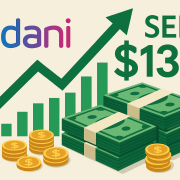Solana is hosting a pilot for Kazakhstan’s central bank led stablecoin dubbed Evo (KZTE) that is backed by the local fiat currency, with Mastercard helping to integrate it into global payment channels.
KZTE’s launch comes after months of deliberation within Kazakhstan’s regulatory sandbox, where the central bank has been testing frameworks to connect digital assets with traditional finance.
Kazakhstan to create a stablecoin powered economy
The stablecoin is set to play a key role in the central bank’s push to modernize the country’s financial system, with officials framing Evo (KZTE) as a bridge between traditional banking services and the emerging digital asset market, local media outlets reported on September 23.
National Bank Governor Timur Suleimenov said the project represents a milestone in Kazakhstan’s digital transformation as he stressed that blockchain and digital assets could open new opportunities for financial inclusion and innovation for the nation.
Unlike inherently volatile cryptocurrencies such as Bitcoin or Ethereum, KZTE is pegged one-to-one to the Kazakhstani tenge, and therefore can serve as a reliable medium of exchange within both the crypto ecosystem and everyday scenarios.
The stablecoin will be used for settling purchases and sales of crypto assets, and it can also be converted instantly into tenge at the point of payment, allowing merchants to receive fiat liquidity directly.
Officials said that KZTE has been designed in a way that it supports integration with crypto-powered cards, and can therefore help expand the country’s crypto-fiat channel.
This means locals will be able to spend the stablecoin across retail networks without facing any conversion delays that are present when using traditional alternatives.
Evo is also expected to feed into Kazakhstan’s longer-term digital finance goals, with officials saying the stablecoin could eventually underpin cross-border settlement systems and provide a platform for tokenized financial products.
Kazakhstan rolled out a central bank digital currency dubbed the digital tenge in 2023, and Evo is expected to complement it as part of the country’s broader digital finance strategy.
At the time, the stablecoin remains operational within the bounds of a regulatory sandbox that lets only licensed participants test new financial technologies under direct supervision.
Evo will be issued by local players Intebix crypto exchange and Eurasian Bank, while Mastercard will provide the connectivity to global stablecoin issuers.
This setup, according to Intebix founder Talgat Dossanov, is the first time Kazakhstan’s central bank has taken a proactive role in stablecoin issuance.
Evo stablecoin powered by Solana
For the time being, the Solana blockchain remains the sole network supporting Evo, giving the stablecoin access to its high-speed transaction capacity and low-cost settlement features.
This makes it possible for KZTE to operate efficiently at scale, a prerequisite if the coin is to be used in both retail payments and crypto exchange activity.
The Solana Foundation, which has been expanding its presence in Central Asia, already has close ties with Kazakhstan through previous agreements with the Ministry of Digital Development.
Earlier this year, the two sides launched the Solana Economic Zone, the first of its kind in the region, created to foster blockchain startups, advance tokenization efforts across capital markets, and also educate developers on blockchain technology.
Kazakhstan’s stablecoin appetite
Over the past year, Kazakhstani regulators have gradually laid the foundation for the creation of a stablecoin economy by introducing regulations.
Kazakhstan has been issuing fiat-backed stablecoin licenses to local firms, and has previously hinted at plans to expand legal use cases for digital assets and has been slowly integrating stablecoins across the public sector.
Earlier this month, the Astana Financial Services Authority announced it would accept license and supervision fees in USD-pegged stablecoins, marking one of the first cases in Central Asia where a regulator allowed on-chain settlement of government fees.
The post Kazakhstan launches Evo stablecoin on Solana, alongside Mastercard appeared first on Invezz




